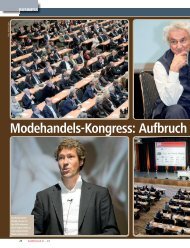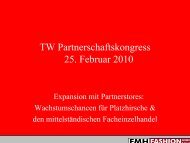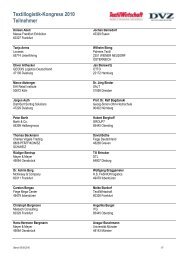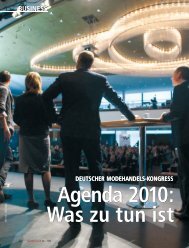UNIQLO Operations - TextilWirtschaft
UNIQLO Operations - TextilWirtschaft
UNIQLO Operations - TextilWirtschaft
You also want an ePaper? Increase the reach of your titles
YUMPU automatically turns print PDFs into web optimized ePapers that Google loves.
Promoting Diversity<br />
Creating Work Environments with People from Diverse Backgrounds<br />
Promoting Diversity<br />
As part of its commitment to promoting diversity, <strong>UNIQLO</strong><br />
inaugurated its Female Store Manager Project. This project<br />
offers support for long-term career building to<br />
<strong>UNIQLO</strong>’s female store managers, who account for about<br />
20% of all <strong>UNIQLO</strong> store managers in Japan. In addition,<br />
<strong>UNIQLO</strong> publishes a magazine entitled style that highlights<br />
the activities of female employees and holds a “Women’s<br />
Forum” conference periodically on the theme of career<br />
development for women. Male supervisors and other male<br />
employees are invited to these conferences, and they<br />
stimulate a lively exchange of opinions.<br />
Employment of Persons with Disabilities<br />
Beginning in 2001, <strong>UNIQLO</strong> has adopted a goal of having<br />
at least one worker with disabilities on the staff of each of<br />
its stores, thus providing <strong>UNIQLO</strong> staff with opportunities<br />
to work with team members from diverse backgrounds.<br />
As of June 2007, 7.43% of <strong>UNIQLO</strong> employees have disabilities,<br />
thus making <strong>UNIQLO</strong> one of the leaders of such<br />
initiatives in Japan among companies with 5,000 or more<br />
employees. These initiatives have been recognized, and in<br />
June 2007, <strong>UNIQLO</strong> received the “Award for Supporting<br />
Re-Challengers” from Japan’s Cabinet Office.<br />
40<br />
Beginning in April 2007, <strong>UNIQLO</strong> introduced a program for<br />
regular employees that allows them to be employed in a specific<br />
region and not be subject to rotation among different<br />
areas. This program is targeted at capable employees who<br />
otherwise would not aspire to become regular employees<br />
because of the issues that regional job rotation would pose<br />
for their personal lives and it provides them with opportunities<br />
for a fuller work life. As of September 2007, about 1,900 persons<br />
had become regional regular employees, and <strong>UNIQLO</strong> is<br />
scheduled to provide this status to about 5,000 employees by<br />
the end of March 2009.<br />
Chizuru Takeda of the Ginza Store Comments:<br />
“The regional regular employee program has definitely raised<br />
my motivation.”<br />
“I joined <strong>UNIQLO</strong> as a part-time employee, but took advantage of this<br />
new program to become a regular, permanent employee. I thoroughly<br />
enjoyed serving customers but wanted to move to a more-responsible<br />
position. My motivation went way up when I became a permanent<br />
staff, and I told myself I’m going to give it all I got!”<br />
FAST RETAILING ANNUAL REPORT 2007<br />
Regional Regular Employee Program<br />
Improving “Work/Life Balance”<br />
One of <strong>UNIQLO</strong>’s main aims is to create an environment<br />
where employees can work with ease and feel secure,<br />
and in keeping with this, there is a system in place that<br />
allows time off for child-rearing and caring for sick family<br />
members as well as a consulting function for mental<br />
health care. In the Tokyo Office, Tuesdays through Fridays<br />
each week are “no overtime days,” and there is a cap on<br />
overtime hours per month at <strong>UNIQLO</strong> stores. <strong>UNIQLO</strong> has<br />
initiated a program to promote a good work/life balance<br />
that includes encouraging the use of allotted vacation<br />
time.<br />
Employment Ratio of Persons with Disabilities<br />
(%)<br />
10<br />
8<br />
6<br />
4<br />
2<br />
0<br />
1.27<br />
6.35<br />
6.81<br />
7.55<br />
7.66<br />
7.31<br />
7.43<br />
Legal<br />
Minimum:1.8<br />
FY 2001 2002 2003 2004 2005 2006 2007<br />
Note: The employment ratios for the years through 2006 are as of March 31 of<br />
each year; the employment ratio for 2007 is as of June 1, 2007.













